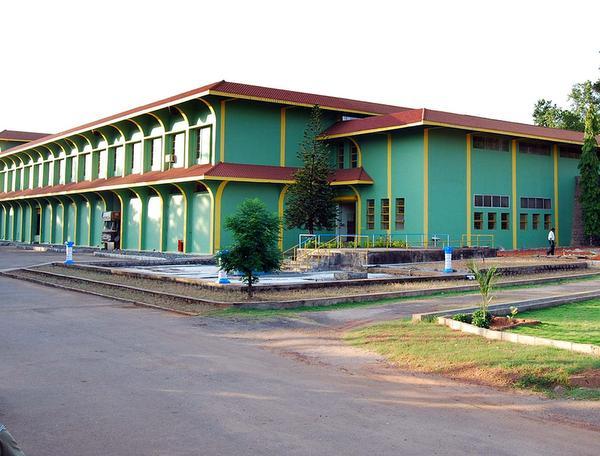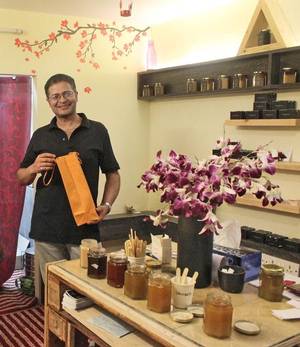What’s common between an IT accountant, a driver, a retail manager and a grocery store-owner? Goats.
The overwhelming smell of goat dung greets us as we walk into Vistara’s farms in Kunthur, Karnataka. The auditory accompaniment is the bleating of hundreds of goats and the hysterical barking of the Mudhol guard dog. Inside the farm, the goats, grouped according to size and sex, stand in their wooden stalls, eyeing us.
The big male goats reach almost to our shoulders. They push around in their pens, their long, silky brown ears flapping around their big, bony faces. As a welcome drink, we are offered a glass of fresh goat milk, still warm and frothy. The taste is not unlike cow milk, but with an added smokiness. Krishna Kumar A.N. and his friends show me around their farm with a sense of proud proprietorship.
With kid gloves
When Krishna starts talking about his goat farm, it’s difficult to get a word in edgeways. On the nearly 160 km drive from Bengaluru to this farm in Kunthur, Krishna has barely paused in the recital of his dream of promoting goat-milk products. His loquacity is apparently quite typical, quip his close friends, who are now his partners at Vistara Farms and are travelling with us.
“I’m just a bridge,” Krishna says, when described as the prime mover behind Vistara, but he is not just any bridge. He has been the link that has brought together 20 people from diverse experiences to turn an ordinary village remedy into a business venture.
Krishna persuaded them to put in their small savings, and he took a personal loan by mortgaging his mother’s jewellery. They bought a farm near Kunthur and began stocking up on goats. Now they have two farms and 200 goats supplying 50 litres of milk per day.
“When we were young, if someone fell ill in our village, they would say, ‘give him goat milk,’” says R. Chetan Kumar, 31, one of Krishna’s friends, who now manages Vistara’s marketing. And as the last days of school drew to an end and the discussions of what to do with their lives got more heated, they remembered the health benefits of goat milk and the fact that it wasn’t easily available. Nor had goat milk caught on in the cities. Krishna and his friends wanted to turn this to their advantage. “We decided to go into business together and start a goat-milk farm,” he says.
The village wisdom is seconded by Sagari Ramdas, veterinary scientist and member of Food Sovereignty Alliance. She says: “In rural areas, the milk of the mother goat is reserved for the goat kids and some of it is used for tea and as a medicine. Traditionally, goat milk has always been used for the sick, the elderly, children and TB patients. It is thought to be good for healing fractures.”
The dream notwithstanding, it wasn’t until 2013 that the friends could buy four acres of land for their farm. Then it was time to buy the goats. After talking to breeders, Krishna zeroed in on the Beetal breed. They purchased the first 15 Beetals from Tavarekere in Begaluru, and the rest from markets in Pune, Punjab and Mysuru. From here on, getting goat milk to the market seemed easy enough.
But it wasn’t. In the first few months after starting the farm, they lost over 150 goats. First, the feed was wrong. Next, the pens were too cold. Next, mosquitoes attacked the goats. Neither villagers nor government officials were able to help. The fledgling farmers drew a blank. So they fell back on their own instincts to set things right. “Our goats are like us. If we are comfortable in their pen, they will be too,” says Ravi Kumar D, one of the partners.
They all had day jobs then, but started to visit the farm more frequently. The pens were covered with polynet to keep out the mosquitoes and the cold. The protein content of the feed was reduced. Finally, the results showed.
By early 2016, the crisis was over and they finally began to supply raw goat milk in 200 ml plastic packets in Bengaluru. Each of them would take turns to deliver the milk. They could make ₹50,000 per month just by selling in their own area.
It’s different
However, the supply of raw milk always comes with the risk of spoilage, which is not only a loss but also lowers the profit level. After many rounds of discussion, the group decided to try their hand at making cheese, which has a longer shelf life and fetches a higher price. They contacted cheese-maker Aditya Raghavan, who spent days at the farm to finetune the product.
Four months into production and Vistara now has three types of soft goat cheese and five varieties of yoghurt under the brandname ‘Basta’, which means goat in Sanskrit. Their factory is a small ground floor unit in Vijaynagar.
We arrive there early in the morning to watch the raw milk, which has been preserved in the fridge all night, being boiled in a double boiler. In the fridge are two sets of soft cheese, made a day apart, wrapped in muslin, and a big block of feta, ready to be packed.
Krishna and company are very proud of their feta as it is 100% goat milk, unlike most of feta available in upmarket stores that is usually 90% cow milk and only 10% goat milk. Priced at ₹320 for a 100gm packet, customers seem to love it, and feta currently accounts for 60% of their sales.
Firm footing
Vistara’s other product is their fruit-flavoured goat-milk yoghurt. They have four uncommon flavours — custard apple, honey-banana, chikoo and tender coconut — and the yoghurt contains real fruit pulp. In 2016, Vistara Farms was established as a private company. The friends are so buoyed up they just bought a second farm in Malavalli, 40 km away. Other friends have opted to join the business. A few months ago, the friends finally quit their jobs and became full-time goat farmers.
Plans are on to increase the number of goats to 3,000 and start exporting the cheese to other cities. One future model they are considering is to give the goats to the villagers for upkeep and take only a steady supply of milk.
It was quite a modest dream; did they think they would come this far? Their only response is a cheesy grin.
The writer is happiest unearthing stories and chasing them down.
source: http://www.thehindu.com / The Hindu / Home> Field Notes> Society / by Priti David / February 10th, 2018










